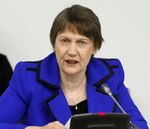Tuning the tools to assess sustainability
Published on Thu, 2012-06-21 17:31
A high-level forum at the UN Conference on Sustainable Development (Rio2012) offered this week an opportunity to debate how to measure the social progress of the countries and the whole world without merely depending on economic indicators, and assessing at the same time the damage caused by human activities to the well-being of the future generations. United Nations Development Programme (UNDP) administrator Helen Clark, who moderated the panel, stated then the basic elements for a future “Sustainable Human Development Index”. “Equity, dignity, happiness, sustainability – these are all fundamental to our lives but absent in the GDP [gross domestic product],” Clark said. “Progress needs to be defined and measured in a way which accounts for the broader picture of human development and its context.” Designed 22 years ago by the UNDP, the Human Development Index (HDI), a composite measure of health, education and income, has become an alternative to GDP for assessing countries’ progress. “UNDP believes that the HDI could be a starting point for a more comprehensive measure of sustainable development,” Clark said at the forum, entitled “Beyond GDP: Measuring the future we want”. President Michael Chilufya Sata of Zambia and Prime Minister Helle Thorning-Schmidt of Denmark took part in the debate held on Wednesday, followed by Roberto Bissio, Coordinator of Social Watch; Mary Barton-Dock, head of the World Bank’s Environment Department; and Enrico Giovannini, head of Italy’s National Office of Statistics and former chief statistician for the Organisation of Economic Cooperation and Development (OECD). Khalid Malik, the director of UNDP’s Human Development Report Office, reviewed the advantages as well as the challenges in measuring sustainability from a people-based, human development perspective. The conceptual framework for an HDI-based assessment of sustainability reflects the human development concept of intergenerational equity, based on principles of global justice and rooted in the premise that choices made today should not limit choices available to people in the future. The people-centered, HDI-based approach to assessing sustainability also incorporates the idea of planetary thresholds, showing how climate change in particular is already posing severe long-term human development risks, most acutely in poor nations and poor communities. In his comment, Bissio remembered that “already 20 years ago, chapter 40 of Agenda 21 stated that GDP is not the tool to measure sustainability and that we need sustainable development indicators. And in 20 years this indicators have not been agreed upon, even when a lot of work has been done by UN experts, and the reason why this has not been possible is not the fault of statisticians but of the politicians. When you agree on indicators, you become accountable, and that’s what makes it so difficult.” “Civil society, when trying to monitor international commitments, has learned that, first, there is not empowerment without accountability and, second, there is not accountability without numbers,” he added. “If we can not at some moment put numbers on the table the debate becomes ideological and fruitless. Numbers can empower people by allowing them to demand accountability on many different issues and also to demand justice for future generations that depend on sustainability to be measured” “Our big request to the UN is to please produce the numbers that can allow us to hold our governments accountable. This is really essential and it requires the authority of, by example, the UN Office of Statistics to make those numbers really credible,” concluded Bissio. The final Rio2012 declaration submitted for adoption by UN members states: “We recognize the need for broader measures of progress to complement GDP in order to better inform policy decisions, and in this regard, we request the UN Statistical Commission, in consultation with relevant UN System entities and other relevant organizations, to launch a programme of work in this area building on existing initiatives.” Sources
|
SUSCRIBE TO OUR NEWSLETTER



